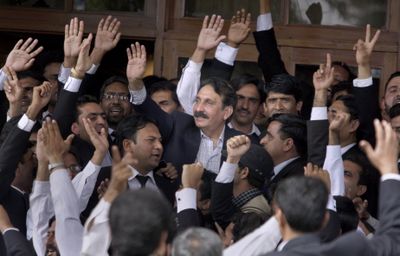Pakistani justice revered
President lies low as nation celebrates Chaudhry’s return

ISLAMABAD, Pakistan – On a day of delirious celebrations that Pakistan’s popular chief justice was getting his job back, President Asif Ali Zardari stayed conspicuously out of sight.
The 52-year-old president, whose popularity had been flagging even before Pakistan’s latest political crisis, was like an unwelcome guest Monday at a raucous nationwide party, pilloried for his heavy-handed treatment of activists who championed the cause of Chief Justice Iftikhar Mohammed Chaudhry.
Now, diplomats, analysts and ordinary Pakistanis are questioning whether Zardari, who seemed to have badly misread public opinion, will be able to hang on to his dual roles as head of state and leader of the Pakistan People’s Party.
Many senior People’s Party members were horrified by the authoritarian measures Zardari ordered to try to suppress a march by backers of opposition leader Nawaz Sharif and members of a lawyers’ movement that fought for two years for Chaudhry’s reinstatement.
The crackdown included hundreds of arrests and tight restrictions on political gatherings. Information Minister Sherry Rehman quit over the weekend to protest threatened restrictions on a major TV channel, Geo. Amid the backlash, commentators suggested that Zardari might be reduced to a figurehead president, with Prime Minister Yusaf Raza Gillani, who was relatively untainted by the controversy, taking greater authority.
“The party is in a difficult situation after this development, and the feeling of being upstaged by a rival is definitely going to leave a bitter taste,” said Ahmed Bilal Mehboob, the executive director of the nonprofit Pakistan Institute of Legislative Development and Transparency.
Mehboob said he expected that sentiment to translate into a curtailment of Zardari’s “unbridled authority” as president – a legacy of Zardari’s predecessor, Pervez Musharraf, a general who granted himself extraordinary powers.
Some analysts said a split was possible between pro- and anti-Zardari camps within the People’s Party, which was the largest vote-getter in parliamentary elections 13 months ago. According to opinion polls, it since has lost ground to Sharif.
Zardari is regarded in the West as an important ally in the battle against a powerful Islamic insurgency; Sharif has close ties to Islamist parties and is viewed with some wariness by the Obama administration.
At celebratory gatherings across the country Monday, People’s Party stalwarts avoided mention of Zardari, instead seeking to portray Chaudhry’s reinstatement as fulfillment of a pledge by former Prime Minister Benazir Bhutto, the assassinated wife of Zardari.
“This outcome is in accordance with her wishes,” said Aitzaz Ahsan, the most prominent and respected leader of the lawyers’ movement.
The danger that the Chaudhry affair could have spiraled out of control also carried an explicit reminder that Pakistan’s military still considers itself a guardian of public order.